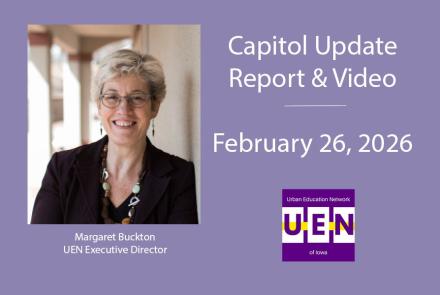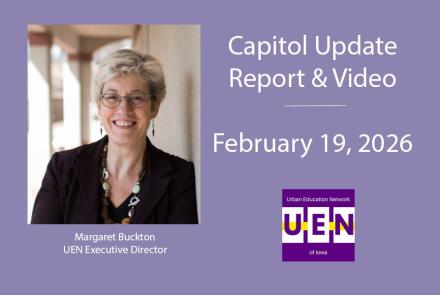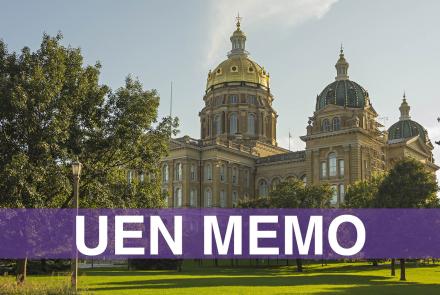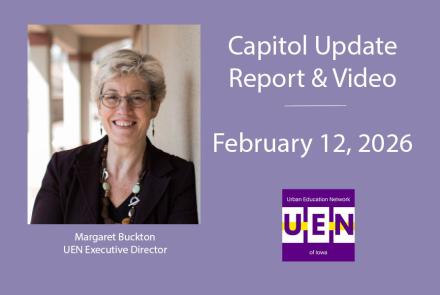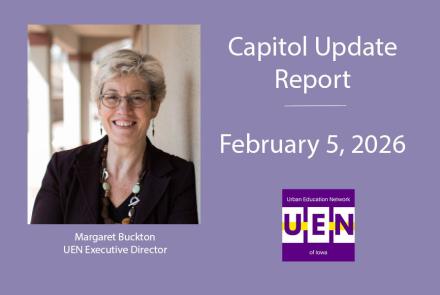Capitol Update - January 26, 2023
UEN Legislative Update
Jan. 26, 2023
Download the printable UEN Legislative Update 01/26/2023
In this UEN Weekly Report from the 2023 Legislative Session, find information about:
- School Choice HF 68 Passed and Signed by the Governor
- School Funding: SSB 1081 Introduced in the Senate
- SSB 1076 Education Standards Flexibility Introduced
- Subcommittee Action on Other Bills and Bills Introduced
- Advocacy Action Steps for This Week: Key Messages on School Funding
- Links to Advocacy Resources
- Members of Important Education Committees
School Choice Moves Fast in the House, Senate and Signed by the Governor
HR 3 House Rules: this resolution amended House debate rules to exempt any bills from the Education Reform Committee from Appropriations or Ways and Means Committee approval, meaning that HF 68 could move directly from the Committee to the House Calendar. UEN was registered opposed to this rule, especially since HF 68 has an estimated $918 million impact over four years and exempts the ESA amount from Iowa income tax. This rule change shortened the time frame during which Iowan’s could contact their legislators about their concerns. The resolution was approved 58:40 by the House, allowing HF 68 to come directly to the floor for consideration on Monday.
HF 68 was amended and approved in the House Monday night, 55:45. Republican Representatives Bergan, Best, Bloomingdale, Ingels, Lohse, G. Mohr, T. Moore, Sieck, and Siegrist voted no along with all House Democrats. Republican Senators Evans, McClintock, and Shipley joined the Senate Democrats in voting no that night (after midnight, so Tuesday morning, actually), with the final vote 31:18. The provisions of the bill, as amended, include:
- ESAs equal to the State Cost per Pupil to pay tuition and fees to accredited private schools and other expenses ($7,598 based on the Governor’s 2.5% SSA recommendation.)
- Fund controlled by DE sets up the ESAs and allows a contract with a 3rd-party provider to manage the fund (application, eligibility, accounts, audits, and fraud prevention). If a parent commits fraud, DE is to recover funds and the parent is prohibited from participating.
- Allows unspent ESA money to be retained until graduation or age 20, whichever happens first.
- Excludes the scholarships from income taxes (retroactive to Jan. 1, 2023).
- Requires recipients of an ESA to be tested by mandated state and federal assessments. The assessments for state and federal compliance posted on DE’s web wage include:
- ISASP
- DLM
- ELPA21
- ELPA 21 Screener
- PK GOLD (doesn’t apply, no ESAs for preschool)
- Early Literacy Universal Screener and Progress Monitor
- ELAA for IEP Students
- Diagnostic Lit Assessment
- End-of-unit assessment for students taking ½ unit U.S. Government
- Eligibility: Student must be enrolled in an accredited private school to apply for ESA before June 30. Students in homeschool settings do not qualify for an ESA in this legislation unless they enroll in a private accredited school. ESAs will be available based on the following eligibility:
Year 1: School Year 2023-24
-
-
- All entering kindergarten students
- All students not enrolled in a private school for the prior two semesters (could be either homeschool, from a public school, or potentially new to the state).
- A student enrolled in a private school with a household income at or below 300% of the federal poverty line, $83,250 for a family of four.
-
Year 2: School Year 2024-25
-
-
- All entering kindergarten students
-
- All students not enrolled in a private school for the prior two semesters
-
- A student enrolled in a private school with a household income at or below 400% of the federal poverty line, $111,000 for a family of four.
- A prior year recipient of an ESA
- All entering kindergarten students
-
Year 3: School Year 2025-26
-
-
- All K-12 students in Iowa, regardless of income
-
- Categorical Funds: includes students receiving an ESA who are residents of a public school in the enrollment count for categorical funding purposes, an average of $1,205 per student, for TSS, PD, EICS, and TLC. The exact amount will be determined by the district’s aid and levy worksheet per pupil amounts. Such students will first be counted Oct. 1, 2023, with funds first available in the budget beginning July 1, 2024. This includes all ESA recipients, even if they have never attended the public school.
- Qualified educational expenses: includes tuition and fees at a nonpublic school, textbooks, fees or payments for educational therapies, including tutoring or cognitive skills training, curriculum fees, software, and materials for a course of study for a specific subject matter or grade level, tuition or fees for nonpublic online education programs, tuition for vocational and life skills education approved by the department of education, education materials and services for pupils with disabilities from an accredited provider, including the cost of paraprofessionals and assistants who are trained in accordance with state law, standardized test fees, and advanced placement examinations or examinations related to postsecondary education admission or credentialing. Qualified educational expenses are limited to these items and rules adopted by DE to implement this section. Expenses made from the ESA are prohibited from including transportation costs for the pupil, the cost of food or refreshments consumed by the pupil, the cost of clothing for the pupil, or the cost of disposable materials, including but not limited to paper, notebooks, pencils, pens, and art supplies. Private school expenditures are not audited and likely could be used for transportation or any of these other items once tuition is paid to the private school.
- Private School Authority: Private school is not under any additional regulation. No required change in academic or enrollment requirements. Private school is to be given maximum freedom to meet the needs of students. No regulation on expenditures once the private school receives tuition and fees. No prohibition to raising tuition. The only requirement is state and federal assessments given to students with an ESA (eventually all who apply) see above.
- Compliance requirements Chapter 284: Requires any TSS distributions to follow Chapter 284 provisions (TQ Committee, etc.), however, allows relief from the TLC mandates in chapter 284 if used for TSS. Awaiting DE guidance to further interpret how broadly the TLC flexibility will apply. This particular provision looks to be broader relief from the mandates than just if the districts uses the funds for TSS:
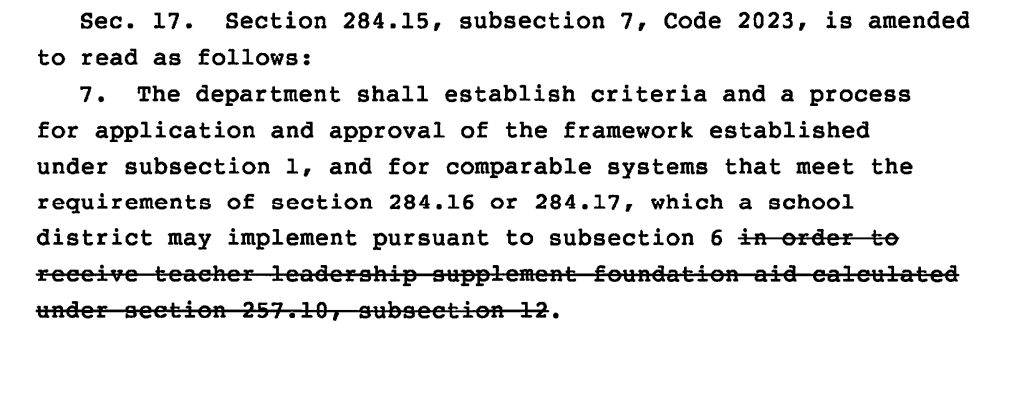
- Flexibility: allows TLC, PD and TAG (Talented and Gifted) ending balances to be used for any TSS purposes. (TLC and PD can both already be used vie the flexibility account for any general fund purpose and a few others).
- Operational Sharing: extends Operational Sharing through 2034, but does not change the 21 -student cap or repeal the supplementary weighting roll-back (3 student count becomes 2 and 5 student count becomes 4)
- Appropriation: sets a standing, unlimited appropriation equal to the amount necessary to pay for the ESAs (and beginning July 1, 2024, state aid will include the amount for categorical funds for resident private school students.)
Reflections on this process: The process was so shortened by procedural exceptions (committees of the whole rather than subcommittee meetings, removing legislation out of the Education Reform Committee from Appropriations or Ways and Means Committee oversight, amending big policies on the floor rather than in Committee). This had the effect of limiting public access to their legislators, yet thousands of Iowans reached out to their senators and representatives asking for support for public education. Elections have consequences and with stronger Republican majorities in both chambers combined with the Governor’s election momentum, this was inevitable. This is now the law of the land.
Since it was done quickly, we have the advantage of focused advocacy on adequate school resources and flexibility districts need to best meet the needs of students. It was refreshing to hear during the debate that Republicans in both chambers support public schools. We also heard that the scale-up of ESAs is sustainable because they are predicting a $3.4 Billion surplus in FY 2027. If that’s the case, a 5% SSA rate is also sustainable (would cost about 10% of that estimated FY 2027 surplus).
Look forward to Calls to Action on school funding. We anticipate the Senate Education Committee could start debate on SSA as early as Monday afternoon.
SSB 1081 2% SSA: this bill introduced in the Senate is assigned to the Senate Education Committee and sets the SSA rate at 2%. It also appropriates the amount necessary to fund transportation equity payments. There is no action in this bill to make further progress on formula equity, closing the gap between the state cost per pupil and higher district cost per pupil. UEN is registered opposed to this bill, as it falls well short of the inflation rate, while student needs are high and teachers are in short supply. We anticipate the Senate Education Committee could start debate on SSA as early as Monday afternoon, as the bill is assigned a subcommittee of the entire Senate Education Committee.
SSB 1076 Education Standards Flexibility: this bill, by the Governor, relieves mandates and includes provisions which allow schools to meet the needs of students. The bill is in the Senate Education Committee and assigned a Subcommittee of Sens. Kraayenbrink, Donahue and Rozenboom. UEN is registered in support. Provisions include:
- Eliminates the requires for a Comprehensive School Improvement Plan (CSIP), however, the law would still require districts to:
- report what’s required for federal reporting
- report to community student utilization of career information and decision-making system
- focus on reading proficiency if more than 15% of K-3 students are reading below proficiency
- have an at-risk plan
- report bullying data to DE and community (would not have to send board policy to the DE for accreditation compliance)
- have a teacher and administrator mentoring plan and to link district, attendance center and individual professional development plans to student learning goals
- Librarians: allows person formerly employed in a public library to satisfy the requirement (does not require a Master’s degree) and requires the State BOE to set new rules for library collection updating
- Specifies state board goal of the counseling program: “The program shall be designed to ensure that the guidance counselor can work collaboratively with students, teachers, support staff, and administrators to support the curricular goals of the school by offering responsive services that address the growth and development needs of students and the attainment of student competencies in academic, career, and social areas.”
- Allows up to 5 days or 30 hours of the calendar to be delivered primarily over the Internet.
- Allows Community College courses to meet offer and teach required courses. Eliminates the “good faith effort” to try to employ a teacher and no longer requires districts to seek a waiver. Eliminates the small enrollment requirement, so this opportunity is open to districts of all sizes. Eliminates supplementary weighting if the course is used to meet the offer and teach requirement.
- Allows high school teachers appropriately licensed to teach two or more sequential units in one classroom.
- Also allows a Community College Instructor to teach two or more sequential units, but if both Advanced Placement and Community College credit is offered, the Community College Professor must be appropriately credentialed.
- Eliminates technological literacy from 21st-century learning skills
- Eliminates the requirement to teach family roles in kindergarten
- Removes reference to HIV/AIDS throughout the standards
- Reduces world language minimum offerings from four to two.
- Physical Education flexibility: if a parent requests their student be excused from the PE requirement, they shall be if: 1) Student is seeking relief to be able to enroll in academic courses otherwise not available or, 2) Student is enrolled in work-based learning or other educational program requiring them to leave school premises during the day, or 3) Student is in a school sponsored activity that requires at least as much physical activity per week as 1/8th unit of PE
- Fine arts flexibility: reduces requirement from three to two fine arts offerings. Allows the district to include any of the fine arts (eliminates the requirement for at least two) dance, music, theater or visual arts.
- Health unit flexibility; change “shall include” to “may include”, adds CPR as something you may include and deletes HIV/AIDS references.
- Financial literacy: deletes the graduation requirement and allows but does not mandate the district to include all of the Code content of financial literacy standards throughout the curriculum.
- Human Growth and Development: strike HIV/AIDS references
- Extends operational sharing through 2034. (But wait, HF 68 School Choice already did that.) This bill maintains the weighting rollback (3=2 and 5=4 students) and does not impact the 21-student cap.
UEN is registered in support of this bill. If there are other items of flexibility that we should include in the conversation, please let us know.
Committee and Subcommittee Action
SF 157 Driving Tests (Formerly SSB 1028); allows persons who are qualified to give behind-the-wheel driving instruction but who are not licensed teachers to administer a final field driving test. Approved by the Senate Transportation Committee, 16-0. UEN is monitoring this bill.
HF 132 School Government Curriculum (Formerly HF 12): requires that comparative discussions of political ideologies that conflict with the ideas of freedom and democracy essential to the founding of the US be taught in HS government class. Subcommittee of Reps. Holt, Buck, and Hora met and moved the bill forward to the full House Education Committee. UEN expressed to the subcommittee our preference that the DE convene a standards and curriculum review of social studies content during the normal standards review cycle instead of the legislature mandating content. Approved by the House Education Committee. UEN is registered as undecided.
HF 134 Open Enrollment Transportation (Formerly HF 41): strikes requirements that a sending and receiving district agree to arrangements for transportation for an open-enrolled student and allows the receiving district to go into the resident district to transport students. See SF 29. Approved the Education Committee 19:4. UEN is registered opposed.
HF 139 Cyber Security Center (Formerly HSB 14): establishes a cyber-security simulation training center at ISU to help governments and businesses deal with cyber-attacks. Appropriates $2.5 million for the center. Approved by the Economic Growth and Technology Committee. Assigned to Appropriations Committee. UEN is registered in support.
SF 149 Corporal Punishment Immunity (Formerly SSB 1005): gives immunity to a school boards, districts, AEAs, private and charter schools and the authorities in charge of those against liability for corporal punishment against a student to the extent that a school employee or volunteer has immunity and allows for the collection of damages for wrongful accusations to the same extent of a school employee or volunteer who has been wrongfully accused. Approved in the Senate Judiciary Committee, 13-5. Moves to the Senate Calendar. UEN is undecided.
SF 136 Gender Balance (formerly SSB 1037): repeals the requirements for boards to be gender balanced. Approved in the Senate State Government Committee, 12-6; moves to the Senate Calendar. UEN is undecided.
Bills Introduced
HSB 86 Driving to Grandparents: allows a minor with a special driver license to travel to a grandparent’s house, if within 50 miles and authorized by the school. Assigned to the House Transportation Committee. A subcommittee of Meggers, Siegrist and Wilson is assigned. UEN is undecided.
HSB 89 Coach Concussion Training: requires coaches to do a concussion training course to renew an authorization. Assigned to the House Education Committee, with a subcommittee of T. Moore (C), Ehlert, Sorensen. UEN is registered as undecided.
HF 99 School Bus Training: requires the DE to use entry-level driving training as proof the applicant has completed instruction as a school bus driver as long as the course includes passenger endorsement training and school bus endorsement training. Assigned to the House Education Committee. UEN is registered in support.
HF 129 Dyslexia Grants: requires the DE to establish a dyslexia provider grant program to help families offset the cost of services from dyslexia providers. The bill is in the House Education Committee. UEN is undecided.
HF 100 BOEE Licensing Age: strikes the requirement that an applicant for a BOEE license be 21. The bill is assigned to the House Education Committee. UEN is registered in support.
HF 101 Your Iowa Crisis Numbers: requires public schools that service students in grades 7-12 that issue ID cards to include the Your Iowa Crisis telephone and text numbers. Applies to IDs issued after the effective date of the bill but requires schools to use existing IDs until that supply is exhausted. The bill is assigned to the House Education Committee. UEN is registered as undecided.
HF 104 Advanced Dyslexia Grants: appropriates $335,000 in FY 2024 to the DE for an advanced dyslexia specialist endorsement grant program. Allows 25 grants a year to teachers to offset the cost of obtaining the endorsement. Assigned to the House Education Committee. UEN is registered as undecided.
SF 121 HS Athletic Organizations: prohibits public or private high schools from spending public money on dues for athletic/extra-curricular organizations that do not meet requirements to classify schools according to adjusted enrollment and past performance in the activity as of January 2024. Assigned to the Senate Education Committee. UEN is registered in support.
SF 139 HS Bible Studies: directs the State Board of Education to adopt rules on the use of Hebrew scripture and the Bible in an elective Social Studies course to give students knowledge on the poetry and characters of the Bible to help foster understanding of modern society. Prohibits the use of a specific translation. Requires religious neutrality. Requires the State Board to develop guidelines for teacher preparation/continuing education. UEN is registered as undecided. The bill is assigned to the Senate Education Committee.
SF 159 Gender Identity Education: prohibits gender identity/sexual orientation education in schools for grades K-8. Makes definitions. Requires schools to inform parents of all invasive physical exams/health screenings that are not required by federal law. Requires the state Board of Education to establish standards. Requires schools to notify parents about changes in the mental health or well-being. Allows parents to allege violations of policies regarding human growth and development (sex education). Allows parents to appeal to the State Board if the violation is not fixed or to seek court relief. Establishes civil penalties against schools for violations. Assigned to the Senate Education Committee. UEN is opposed.
SF 161 Alternatives to PE: adds additional activities that a 12-grader can use as alternative activities from PE including show choir, marching band and color guard, if a parent requests and the school principal agrees. Assigned to the Senate Education Committee. UEN is registered in support.
SSB 1086 Apprenticeships: establishes an Office of Apprenticeship and an Iowa Apprenticeship Council in the DWD. Gives the Office various duties related to the registration of apprenticeships. Establishes the members of the Council, including the DWD director as an ex officio member. Requires licensing authorities to grant licenses to persons who have successfully completed apprenticeship programs. Prohibits exams for apprentices that are different than the exam for other applicants. Divides training and administration responsibilities between sponsors of apprenticeship programs and employers. Assigned to the Senate Workforce Committee with a Subcommittee of Senators Dickey (C), J Taylor, T Taylor. See HSB 82. UEN is registered as undecided.
SSB 1094 Public Fund Investment: restricts IPERS and other retirement systems and the Regents from contracting with public funds managers that take actions based on economic boycotts, or environmental or social criteria that is not solely based on the financial interest of the funds and the beneficiaries. Defines companies involved in the fossil fuel, firearms, ammunition, agriculture, timber and mining industries as protected. Includes other definitions. Bans granting proxy authority that violates these conditions. Bans investments in companies that are engaged in economic boycotts. Bans state banks and credit unions from using improper factors in loan decisions. Gives the Attorney General enforcement powers. Similar to HF 2. Assigned to the Senate State Government Committee, with a subcommittee of Kraayenbrink (C), Boulton, and Bousselot. UEN is registered as undecided.
Advocacy Actions This Week
- Always start with a thank you! See the UEN 2022 Legislative Session Successes and find one you are grateful for them accomplishing. Thank legislators and the Governor for looking into additional flexibility to pay teacher, preserve and expand programs for students, and rework chapter 12 educational standards requirements to be efficient, effective and up-to-date.
- Reach out to legislators asking for adequate school funding: reiterate key messages:
- Increases in SSA per pupil have lagged inflation and the cost increases of doing the business of schools over the last decade.
- State appropriations have grown faster than the SSA increase due to enrollment growth and the Legislature’s use of the school foundation formula to deliver $200 million in property tax relief to property taxpayers over the last decade. Although taxpayers are likely grateful and this doesn’t necessarily hurt schools, the statements that funding increases are sufficient when $200 million has supplanted local dollars is not a fair representation of the resources available to public schools.
- UEN districts are calling for an SSA rate that reflects the rate of inflation and positions school districts to compete in the labor market for talent.
- Student needs have increased over the last decade as well. Student success depends on having the programs and services necessary to meet individual student needs.
- Budget stress testing for the school choice proposal assumed an ongoing increase in SSA of 2.5%, while estimating an ending balance of over $3.4 Billion. The ending balance demonstrates that the state can afford an SSA increase closer to 5%, which is only one tenth of the surplus shown in 2027.
- See the UEN Issue Brief on Adequate Funding and UEN Issue Brief on Teacher, Administrator and Staff Shortages to find additional background and advocacy information.
Connecting with Legislators: To call and leave a message at the Statehouse during the legislative session, the House switchboard operator number is 515.281.3221 and the Senate switchboard operator number is 515.281.3371. You can ask if they are available or leave a message for them to call you back. You can also ask them what’s the best way to contact them during session. They may prefer email or text message or phone call based on their personal preferences.
Find biographical information about legislators gleaned from their election websites on the ISFIS site here: http://www.iowaschoolfinance.com/legislative_bios Learn about your new representatives and senators or find out something you don’t know about incumbents.
Find out who your legislators are through the interactive map or address search posted on the Legislative Website here: https://www.legis.iowa.gov/legislators/find
UEN Advocacy Resources: Check out the UEN Website at www.uen-ia.org to find Advocacy Resources such as Issue Briefs, UEN Weekly Legislative Reports and video updates, UEN Calls to Action when immediate advocacy action is required, testimony presented to the State Board of Education, the DE or any legislative committee or public hearing, and links to fiscal information that may inform your work. The latest legislative actions from the Statehouse will be posted at: www.uen-ia.org/blogs-list. See the new 2023 UEN Advocacy Handbook, which is also available from the subscriber section of the UEN website
Committee Members:
House Education Committee Members
- Skyler Wheeler (R, District 4), Chair
- Craig P. Johnson (R, District 67), Vice Chair
- Sharon Sue Steckman (D, District 59), Ranking Member
- Brooke Boden (R, District 21)
- Dr. Steven P. Bradley (R, District 66)
- Molly Buck (D, District 41)
- Sue Cahill (D, District 52)
- Taylor R. Collins (R, District 95)
- Tracy Ehlert (D, District 79)
- Joel Fry (R, District 24)
- Dan Gehlbach (R, District 46)
- Bill Gustoff (R, District 40)
- Steven Holt (R, District 12)
- Heather Hora (R, District 92)
- Chad Ingels (R, District 68)
- Monica Kurth (D, District 98)
- Mary L. Madison (D, District 31)
- Heather Matson (D, District 42)
- Thomas Jay Moore (R, District 18)
- Anne Osmundson (R, District 64)
- Ray Sorensen (R, District 23)
- Art Staed (D, District 80)
- Henry Stone (R, District 9)
House Education Reform Members
- Pat Grassley (R, District 57), Chair
- Matt W. Windschitl (R, District 15), Vice Chair
- Jennifer Konfrst (D, District 32), Ranking Member
- Sue Cahill (D, District 52)
- John H. Wills (R, District 10)
Senate Education Committee Members
- Ken Rozenboom (R, District 19), Chair
- Jeff Taylor (R, District 2), Vice Chair
- Herman C. Quirmbach (D, District 25), Ranking Member
- Claire Celsi (D, District 16)
- Chris Cournoyer (R, District 35)
- Molly Donahue (D, District 37)
- Lynn Evans (R, District 3)
- Julian B. Garrett (R, District 11)
- Eric Giddens (D, District 38)
- Kerry Gruenhagen (R, District 41)
- Tim Kraayenbrink (R, District 4)
- Sandy Salmon (R, District 29)
- Amy Sinclair (R, District 12)
- Sarah Trone Garriott (D, District 14)
- Cherielynn Westrich (R, District 13)
- Brad Zaun (R, District 22)
Contact us with any questions, feedback or suggestions to better prepare your advocacy work:
Margaret Buckton
UEN Executive Director/Legislative Analyst
margaret@iowaschoolfinance.com
515.201.3755 Cell
Thanks to our UEN Corporate Sponsors:
Special thank you to your UEN Corporate Sponsors for their support of UEN programs and services. Find information about how these organizations may help your district on the Corporate Sponsor page of the UEN website at www.uen-ia.org/uen-sponsors.
|
|


